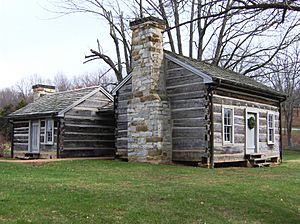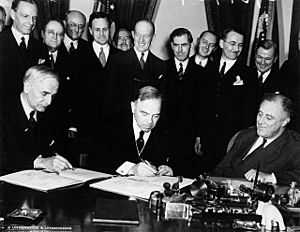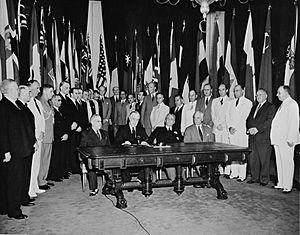Cordell Hull facts for kids
Quick facts for kids
Cordell Hull
|
|
|---|---|
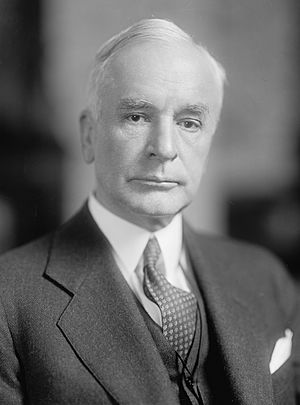
Hull, c. 1905–1945
|
|
| 47th United States Secretary of State | |
| In office March 4, 1933 – November 30, 1944 |
|
| President | Franklin D. Roosevelt |
| Deputy | William Phillips Sumner Welles Edward Stettinius Jr. |
| Preceded by | Henry L. Stimson |
| Succeeded by | Edward Stettinius Jr. |
| United States Senator from Tennessee |
|
| In office March 4, 1931 – March 3, 1933 |
|
| Preceded by | William Emerson Brock |
| Succeeded by | Nathan L. Bachman |
| Member of the U.S. House of Representatives from Tennessee's 4th district |
|
| In office March 4, 1923 – March 3, 1931 |
|
| Preceded by | Wynne F. Clouse |
| Succeeded by | John R. Mitchell |
| In office March 4, 1907 – March 3, 1921 |
|
| Preceded by | Mounce Gore Butler |
| Succeeded by | Wynne F. Clouse |
| Chair of the Democratic National Committee | |
| In office November 2, 1921 – July 22, 1924 |
|
| Preceded by | George White |
| Succeeded by | Clem L. Shaver |
| Personal details | |
| Born | October 2, 1871 Olympus, Tennessee, U.S. |
| Died | July 23, 1955 (aged 83) Washington, D.C., U.S. |
| Resting place | Washington National Cathedral |
| Political party | Democratic |
| Spouse |
Rose Frances (Witz) Whitney
(m. 1917; died 1954) |
| Education | National Normal University Cumberland University (LLB) |
| Awards | Nobel Peace Prize |
| Signature | |
| Military service | |
| Allegiance | |
| Branch/service | Tennessee Volunteer Infantry |
| Rank | |
| Battles/wars | Spanish–American War |
Cordell Hull (October 2, 1871 – July 23, 1955) was an important American politician from Tennessee. He served as the United States Secretary of State for 11 years (1933–1944) under President Franklin D. Roosevelt. This was during most of World War II, making him the longest-serving U.S. Secretary of State.
Before this big job, Hull represented Tennessee in the United States Senate for two years. He also spent 22 years in the United States House of Representatives. In 1945, he received the Nobel Peace Prize for his key role in creating the United Nations. President Roosevelt even called him the "Father of the United Nations."
Contents
Who was Cordell Hull?
Cordell Hull's Early Life and Education
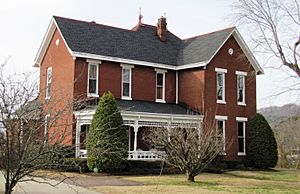
Cordell Hull was born in a log cabin in Olympus, Tennessee. He was the third of five sons born to William Paschal Hull and Mary Elizabeth Hull.
He went to college from 1889 to 1890. At just 16 years old, he gave his first public speech. By age 19, Hull was elected chairman of the Clay County Democratic Party. He studied at National Normal University and later graduated from Cumberland School of Law in 1891. After that, he became a lawyer.
Cordell Hull's Early Career in Politics
Hull began his political career serving in the Tennessee House of Representatives from 1893 to 1897. During the Spanish–American War, he served as a captain in the Fourth Regiment of the Tennessee Volunteer Infantry in Cuba.
From 1903 to 1907, Hull worked as a local judge. Later, he was elected to the United States House of Representatives. He served there for 11 terms, a total of 22 years (1907–1921 and 1923–1931). As a member of the important United States House Committee on Ways and Means, he worked to lower taxes on imported goods (tariffs). He also helped create the federal income tax laws of 1913 and 1916. After losing an election in 1920, he became the chairman of the Democratic National Committee. Hull spent a combined 25 years serving in the House and the Senate.
Cordell Hull as Secretary of State
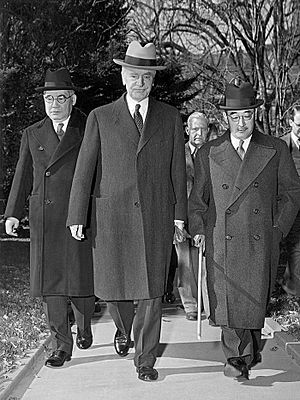
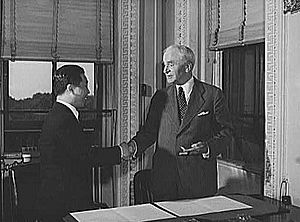
Hull was elected to the Senate in 1930. However, he resigned in 1933 to become United States Secretary of State. President Roosevelt chose him for this role. Hull became one of Roosevelt's strongest supporters from the Southern states during the 1932 presidential election.
As Secretary of State, Hull's main goal was to increase foreign trade and lower tariffs. He led the American group to the London Economic Conference. In 1943, Hull also served as a U.S. delegate to the Moscow Conference.
Working with Other Countries
In 1937, New York City Mayor Fiorello La Guardia made a strong statement about Nazis. Hull sent a letter to Berlin expressing regret for harsh comments on both sides. But he also clearly explained the American principle of freedom of speech.
In 1938, Hull discussed with Mexico's Foreign Minister Eduardo Hay about Mexico not paying Americans for farmlands taken during land reforms. Hull insisted that payment must be "prompt, adequate and effective." This idea, called the "Hull formula," is still important in international law today.
Hull also worked on the "Good Neighbor Policy" with countries in Latin America. This policy helped prevent Nazi influence in that region. Hull also kept relations with Vichy France. He believed this helped French forces join the Allies against Germany and Italy in North Africa.
Hull was also in charge of official statements to other governments. He sent the Hull note to Japan just before the Attack on Pearl Harbor. This note was a proposal for an agreement between the U.S. and Japan. Hull received news of the attack while Japanese diplomats were waiting to see him. He knew the message they carried because the U.S. had secretly read Japanese codes. Hull strongly criticized the diplomats for their country's actions.
Establishing the United Nations
Cordell Hull was a key person in creating the United Nations. This was recognized when he won the Nobel Peace Prize in 1945. During World War II, Hull and Roosevelt worked together to develop a world organization. Their goal was to prevent another major war like World War II. Hull and his team wrote the first ideas for the "Charter of the United Nations" in mid-1943.
Later Years and Legacy
Hull resigned on November 30, 1944, because of his declining health. He remains the longest-serving U.S. Secretary of State. President Roosevelt said Hull was "the one person in all the world who has done his most to make this great plan for peace (the United Nations) an effective fact." The Norwegian Nobel Committee gave Hull the Nobel Peace Prize in 1945. They recognized his efforts for peace, his trade agreements, and his work to establish the United Nations.
In January 1948, Hull published his two-volume memoirs, which are his personal stories and memories.
Personal Life and Death
In 1917, at age 45, Hull married Rose Frances (Witz) Whitney. She was a widow from Virginia. They did not have any children. Mrs. Hull passed away in 1954.
Cordell Hull died on July 23, 1955, at age 83, in Washington, D.C. He is buried in the Washington National Cathedral.
Cordell Hull's Legacy
Cordell Hull's memory is honored in several ways:
- The Cordell Hull Dam on the Cumberland River in Tennessee is named after him. This dam creates Cordell Hull Lake.
- His law school, Cumberland School of Law, has a Cordell Hull Speaker's Forum and a Moot Court Room named in his honor.
- Cordell Hull Birthplace State Park, near Byrdstown, Tennessee, was created in 1997. It preserves his birthplace and displays personal items he donated, including his Nobel Peace Prize.
- A section of highways in Kentucky is named "Cordell Hull Highway."
- The Cordell Hull State Office Building in Nashville, Tennessee, houses the offices of the Tennessee Legislature.
- The "Cordell Hull Room" in the Eisenhower Executive Office Building in Washington, D.C., was his office when he was Secretary of State. It is now used for meetings.
- The U.S. Postal Service issued a stamp honoring Cordell Hull on October 5, 1963.
- Hull is also a character in the musical Annie.
Images for kids
See also
 In Spanish: Cordell Hull para niños
In Spanish: Cordell Hull para niños
 | Selma Burke |
 | Pauline Powell Burns |
 | Frederick J. Brown |
 | Robert Blackburn |


